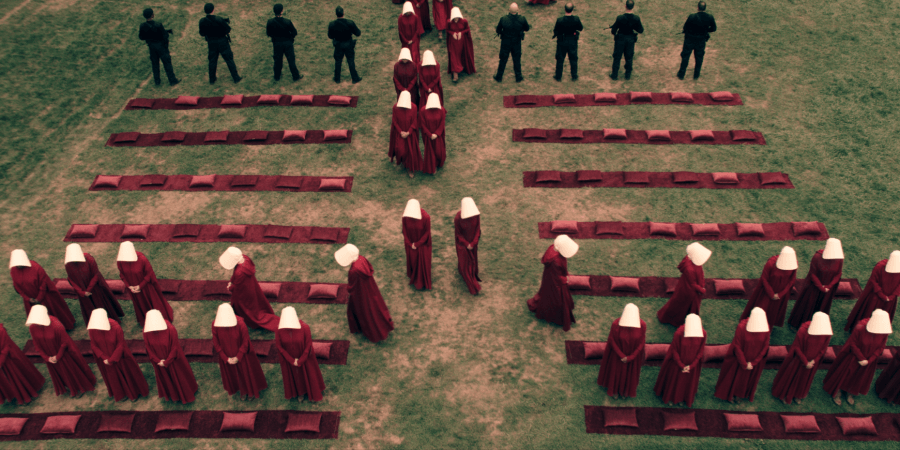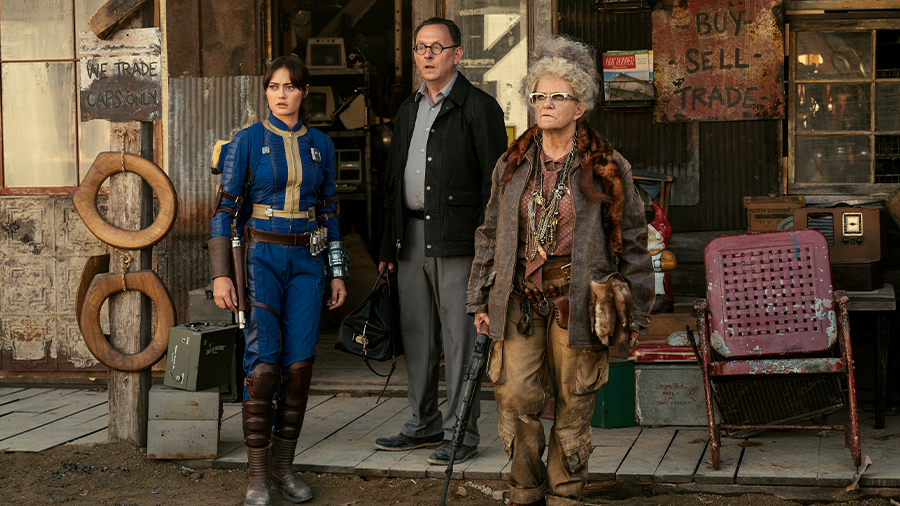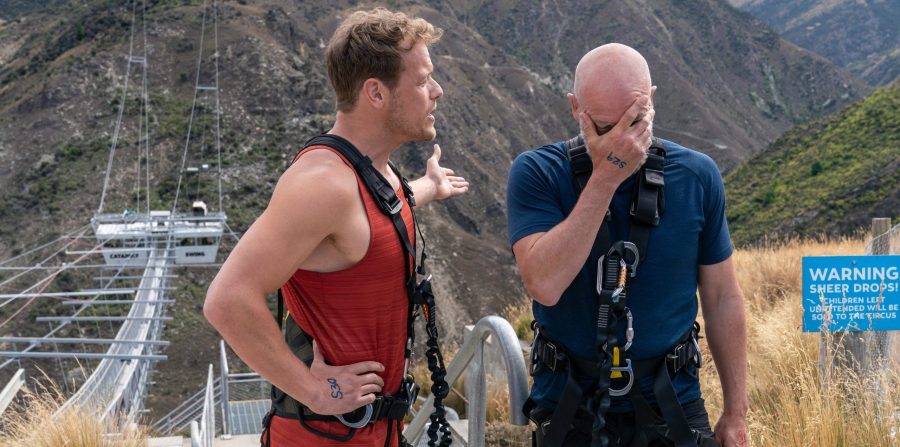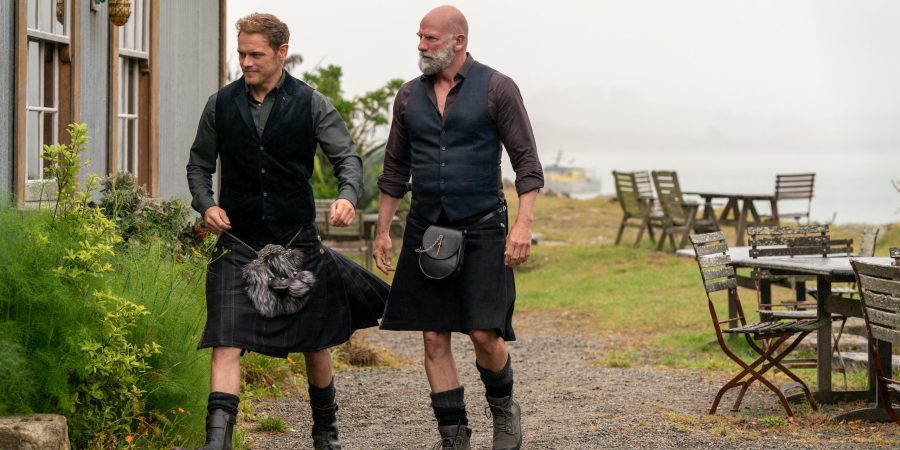Just over 30 years ago, a small book was published that made a big impact on me. I’m sure I read it shortly after it was published, and it’s stayed with me for years. With the paperback coming in at just over 300 pages, it wasn’t the longest book I’ve read, but The Handmaid’s Tale by Margaret Atwood was certainly one of the most influential. It described a frightening but fairly implausible world. Thirty years later, that possibility is no longer so implausible.
I’m not sure how I missed an earlier movie version, but when I heard about Hulu coming out with a TV series based on the book, I knew I couldn’t miss this one. Having seen the first three episodes, I don’t think anyone – especially in this political climate – should miss it, either. No matter what your religious beliefs, this is definitely must-see TV.
So many things are forbidden now.
If you’ve seen the first episode, you know the story’s premise: a combination of man-made and natural disasters have resulted in extremely low birth rates, and a far-right wing religious faction has taken control of the US (but not other parts of the world, as we learn in the book). As a result, women who have proven their ability to bear children are taken forcibly to become Handmaids, breeding slaves to a male-only ruling class. Women are forbidden to read, have no financial rights – or basically any rights. They are either Wives, whether of high-level men or assigned to soldiers; domestics, called Marthas; Handmaids; or Unwomen – gay women, or “gender traitors,” or women who can’t be controlled, sent to serve cleaning up toxic waste, which is basically a death sentence. The men control everything. Anyone who doesn’t conform to a very strict religious based code – priests, gay men, doctors, and more – can be, and are, executed.

Elisabeth Moss, known best from Mad Men and as one of the Bartlet daughters on the West Wing, is the main character and the show’s narrator, handmaid Offred. This is not her name – Handmaids no longer have their own name, but are given a label based on the powerful man they are “assigned” to. Offred has been placed with a Commander (Joseph Fiennes), a high level church/government functionary, and his first name is Fred – so she is “of Fred.” The Handmaid who is her shopping partner/watcher is Ofglen.
Moss is terrific – she deftly conveys the horror of her situation, the difficulty she has controlling her anger and fear, and her deep sadness at the wrenching loss of her daughter, who was snatched from her in the same incident that left her husband, Luke, dead, and began her journey through the Red Center, the horrific training ground for new Handmaids. Her only goal is to survive so that she can find her daughter. But that’s not an easy goal – it’s much easier to give in to the horror of the situation and find a way out.
A chair. A table. A lamp. And a window with white curtains. And the glass is shatterproof. But it isn’t running away they’re afraid of. A Handmaid wouldn’t get far. It’s those other escapes you can open in yourself, given a cutting edge. Or a twisted sheet and a chandelier.
The Red Center, or the Biblically-named Rachel and Leah Center, is shown in flashbacks. Ann Dowd is excellent as the vicious ultra-believer Aunt Lydia, the Handmaids’ trainer. The tactics used to beat the girls into submission are vicious – cattle prods, beatings, ritual shaming (the girls are forced to shout “her fault” at a victim of gang rape), and even the removal of eyes, and later in the series, other body parts (“if thine eye offends thee, pluck it out”). Aunt Lydia is convinced that this is the better path for women, making them righteous and pure. “They were dirty women,” she tells a group of Handmaids-in-training. “They were sluts. But you are special girls. You will serve the leaders and their barren wives. You will bear children for them.”

Handmaids aren’t the only group of women who have restricted lives. Women in any class aren’t allowed to read, for instance. The scene in the grocery store – religiously named “Loaves and Fishes” – showed picture icons on all of the products. One Handmaid comments on the ongoing war against groups of protesting former citizens, and says “It was in the news,” and the other Handmaids look at her, horrified that she would comment on current events that women, we assume, should have no knowledge or interest in. Quickly realizing her error, she desperately says, “I didn’t read it!”
The Wives are another tragic group, though not as sympathetic as the Handmaids. Who would enjoy having to be part of a “ceremony” where their husband had to copulate with another woman, for the sole purpose of doing something you could not, to get pregnant? And the Wives are part of this strangely cold ritual, focusing on the most intimate of acts – the Handmaid must lie with their head in the Wife’s lap, holding hands, while the man, fully clothed, performs to completion and leaves. Yvonne Strahovski, formerly in Chuck, is the cold, seething Serena Joy, Offred’s Commander’s Wife. In the book, Serena Joy had an interesting background, which Offred knew – I hope this will find its way into the show, but it isn’t a necessary part of the story.
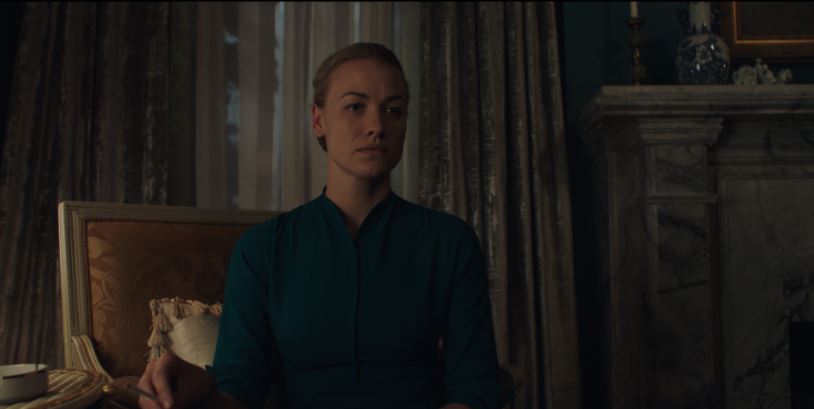
One of the most interesting characters is Offred’s friend from “before,” Moira. Moira (Samira Wiley) is a freespirited lesbian (“gender traitor”) grabbed as her wife and child ran for the safety of Canada. Moira is already partway through the spirit-crushing process of the Red Center when Offred is brought in, and pushes her to keep her sanity and not follow Jeannine, another new Handmaid, into insanity. “This is contagious,” Moira hisses at Offred. “You want to see your baby girl again, keep your fucking shit together.” How can such a strong woman survive in this society?
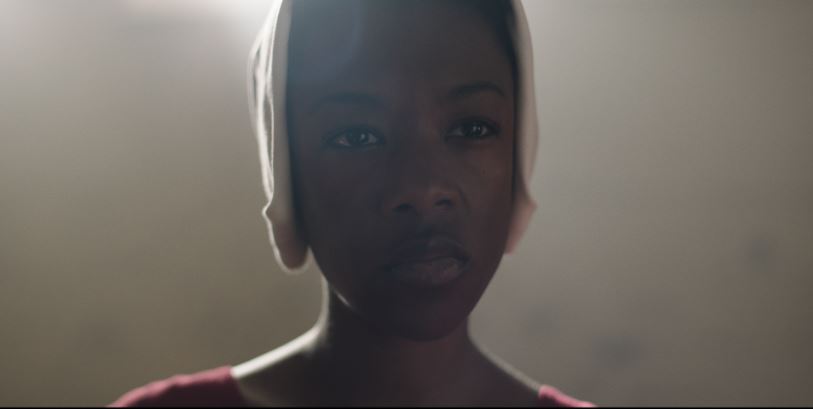
The strict stylization of this series is terrific – muted colors except for the bloodred Handmaid dresses and cloaks. The Marthas in dull brown, the Wives in blue, stern, humorless, frightening men in black. Any other color is relegated to a few glimpses – for example, the line of young girls in identical pink sack dresses (as Offred hungrily scans them for any possible sighting of her lost daughter); the green grass that becomes the killing ground in the Particicution, an exercise that gives the Handmaids an “acceptable” outlet for their rage at a situation they can’t do anything about. Or the blue of water, in the river and Offred’s bath, that represents a potential way out for desperate women.
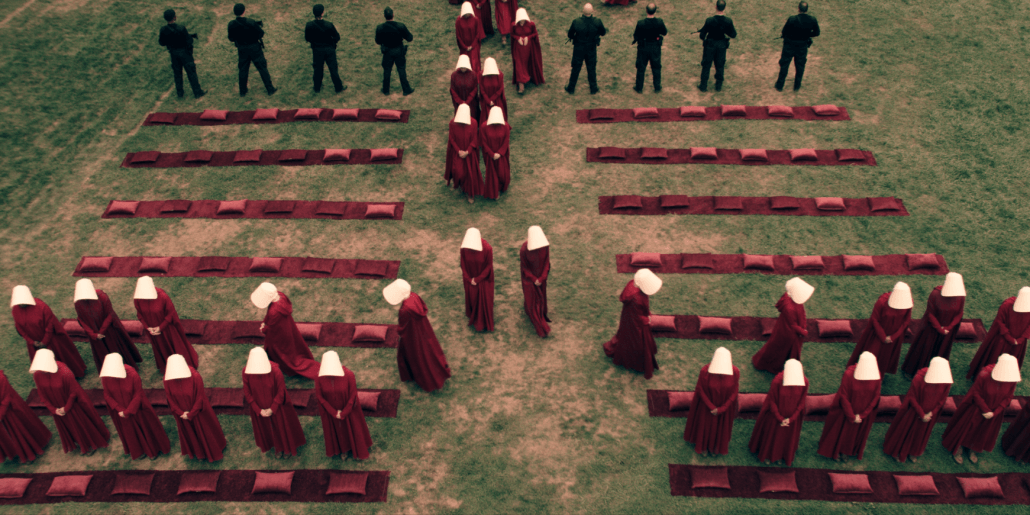
One difficulty with being familiar with the source material is that you look for specific moments, lines and actions to be reproduced from book to series. Since this is really a small book, I was concerned with how they would stretch it into a potential multi-season series. And the first episode does actually go very quickly through some of the important events in the book, but there’s so much not actually written that can be expanded for the series. So far, throughout the three episodes I’ve seen, the show is very faithful to the book, but fleshes out events leading up to the present situation.
And writer/creator Bruce Miller does a great job showing, in flashbacks, the years before the total takeover – Offred’s (we don’t learn her real name until the end of episode – something we don’t learn at all in the book) journey from being a carefree college student to surprisingly becoming pregnant and marrying, to the fiercely loving mother of an adorable three year old. The beautifully shot short aquarium scene was particularly wrenching.

Thirty years ago, this type of a future seemed impossible. Women were beginning to make major strides in the workplace, “work-life balance” was a new phrase, the Alt-Christian-Right wasn’t seen as being mainstream. But today, the political climate feels like it could be heading toward a world that might take a turn any minute. Schools regulating “decency” in not only prom dresses, but everyday clothing – purportedly for the girls’ sake, but really because of “rape culture” – why should men take responsibility for their own actions? Women must have provoked it, “asked” for it somehow, if they’re attacked. Therefore, it’s on women to make sure they don’t tempt men (are burqas next?). (As I write this, I’m watching an NBC news report about the pervasiveness of sexual harassment in the workplace.) We have a President who bragged about “grabbing women by the pussy.” Bill O’Reilly has just been fired from right-leaning Fox News, for sexual harassment.
And environmental regulation rollbacks don’t mean good things for an increasingly toxic planet – and toxins have dire health effects. Coupled with greater reproductive choice and a currently overcrowded world, the birth rate could in fact slow down. (The US birth rate has actually declined significantly from 1910 to 2005 – 30.1 live births per 1,000 people in 1910 to 13.8 per 1,000 in 2005. source: Infoplease)
https://youtu.be/PJTonrzXTJs
The 10-episode series began today, with the first 3 available immediately. A new episode will be released every Wednesday (unlike other streaming sites, which release the entire season at once). Don’t have Hulu? Try their 30-day free trial. You can find that offer here.
Follow me on Twitter: @ErinConrad2 and @threeifbyspace
Like us on Facebook or Subscribe
Share this article using our Social Share buttons above!

